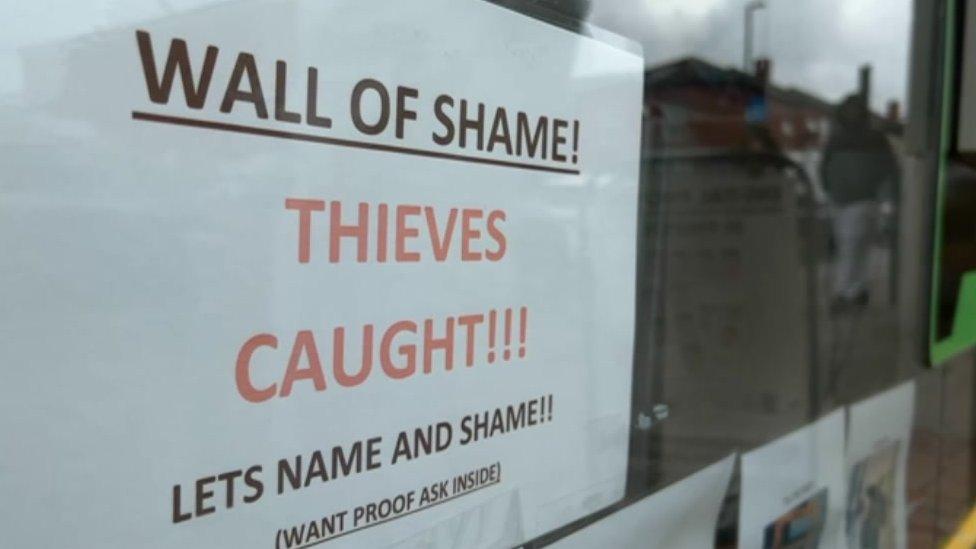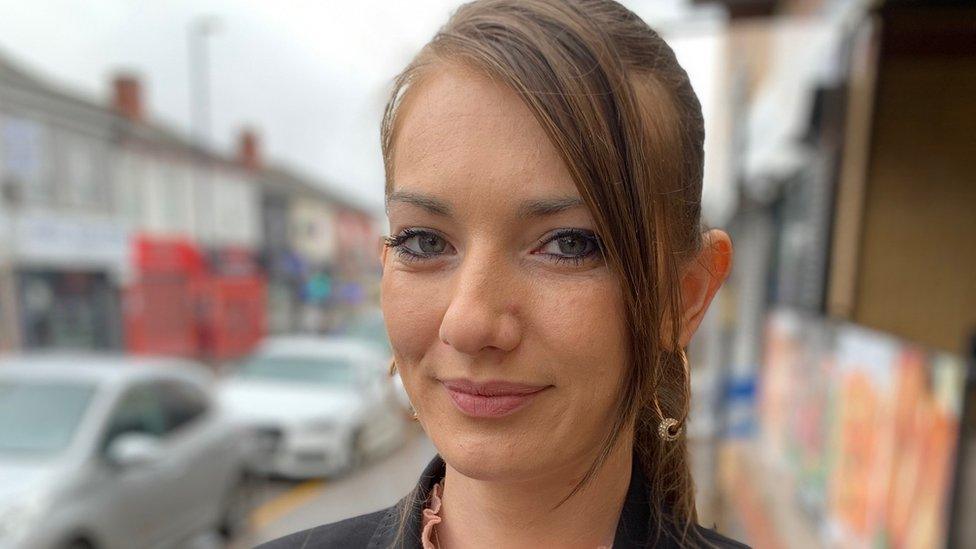Birmingham shop manager starts 'wall of shame' to deter thefts
- Published
Whasuf Farooq says his pharmacy is frequently targeted by thieves
Some shopkeepers say they are spending thousands of pounds bumping up security amid a surge in shoplifting during the cost-of-living crisis.
Retailers in the UK spent more £722m on crime prevention last year., external
Some in the West Midlands have resorted to posting their CCTV footage on social media, complaining police are not doing enough trace the suspects.
One has even started a "wall of shame" by putting up images of alleged offenders outside his shop.
Recorded shoplifting offences increased by 29% in the West Midlands over the past two years, government figures suggest., external
Whasuf Farooq, of Pak Pharmacy in Saltley, Birmingham, said he was repeatedly targeted by thieves who had stolen thousands of pounds worth of medicines, with some using their children to help.
"Some parents I've seen have literally handed their kids the items to put into the pram," he explained.

Lara Conradie, of the British Retail Consortium, said thefts seemed to be rising during the cost-of-living crisis
The shopkeeper said he had become so fed up with people stealing medicines he had posted blurred CCTV images of suspects outside his shop and on social media asking the public to contact police if they recognised them.
Farrah McNutt, chief executive of Catch a Thief UK, said for shopkeepers wanting to take similar action, there was a "vetting process" to go through before being able to display images.
"You need to make sure you follow a procedure" under data protection regulations, she added.
"The police should be doing more," Mr Farooq told the BBC, after he informed officers about his wall of shame.
"They normally say to us 'it's a little crime, we'll give you a reference, we'll get back to you' but they should actually come out and have a look at the footage," he added.
"If [thieves] think they can get away with it they're going to keep going."
Across Britain, shoplifting cost retailers £953m during 2021/22, said the British Retail Consortium (BRC), and some offenders don't know how to stop.
Narinder Kaur, 53, also known as Nina Tiara and originally from Wolverhampton, is awaiting sentencing for multiple counts of fraud, which prosecutors described as shoplifting on an "industrial scale".
She deceived retailers across the region into refunding her for items she didn't buy and was found guilty of 25 separate offences.
Police found £150,000 in cash stashed in her Wiltshire home.

A "wall of shame" has been introduced at one Birmingham shop
Lara Conradie, of the BRC, said the organisation was not surprised by the case.
"We're constantly hearing anecdotes from retailers across the country to say that incidents of theft have risen during the cost-of-living crisis.
"Retailers need to make sure they are reporting all incidents and then the police need to make sure they are attending all incidents."
There is pressure on retailers to ramp up security "causing additional cost pressure to retailers", she added.

Farrah McNutt says information and advice could serve as deterrents for shoplifters
Ms McNutt has been meeting businesses in Birmingham ahead of a security event in the city where hundreds of retailers are set to discuss measures to tackle shoplifting.
"The cost-of-living crisis seems to be making the situation worse," she explained.
"People tend to be stealing now because they need it not just because they want it, and they don't know the help and support that's out there."
She said part of her company's service was to provide lists of food banks, community fridges and shelters to offer help and support as a deterrent to shoplifters.
The West Midlands Police and Crime Commissioner Simon Foster said budget constraints were making it "increasingly hard" to prevent and tackle crimes such as shoplifting.
He said an "innovative programme" called Offender to Rehab in Birmingham was working with prolific shoplifters who were stealing to fund drink or drug addictions.
"Once those offenders get their addiction under control, we find they normally stop stealing too, saving businesses hundreds of thousands of pounds, resulting in the cutting of crime and fewer victims of crime."

Follow BBC West Midlands on Facebook, external, Twitter, external and Instagram, external. Send your story ideas to: newsonline.westmidlands@bbc.co.uk, external